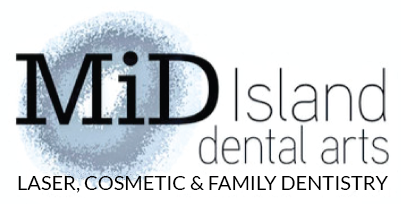Bruxism refers to excessive jaw clenching or teeth grinding, an issue that affects roughly 30 to 40 million Americans. Unfortunately, the actual number of affected people is likely to be much higher. Many Americans are unaware of their bruxism because it usually occurs nocturnally or unconsciously during the day.
At Mid Island Dental Arts, we specialize in the prevention, diagnosis, and treatment of bruxism. If you or a family member suffers from bruxism, our state-of-the-art techniques can help alleviate any painful and potentially harmful symptoms. Education is also a large part of preventing and treating bruxism. During your initial consultation, please be sure to ask any questions and voice concerns, so we can provide you with the appropriate information.
Signs and Symptoms of Bruxism
Because bruxism often takes place during sleep, many people do not realize they have any signs or symptoms. A sleep partner is often the first person to report initial symptoms. The most common signs and symptoms of bruxism include:
| • | A grinding noise at night loud enough to disturb a sleep partner |
| • | A steady increase in pain or tooth sensitivity |
| • | Teeth that have become chipped, fractured, loose, or flattened |
| • | Worn tooth enamel, which exposes deeper levels like the dentin or pulp chamber |
| • | Waking up with a minor headache or feeling unrested after a full night’s sleep |
| • | Rhythmic contractions of the jaw muscles throughout the day |
| • | Persistent soreness, pain, or discomfort in the jaw, face, or neck |
| • | Pain that mimics an earache |
| • | Trouble opening and closing your mouth, especially when chewing, yawning, or speaking |
| • | Swelling on the sides of your face (usually due to excessive jaw clenching) |
Risk Factors for Bruxism
If you or a loved one exhibits any of the symptoms listed above, please schedule an appointment with us as soon as possible. While the exact causes of bruxism are hard to pinpoint, we do know it usually has something to do with physical, genetic, or psychological factors. Risk assessment for bruxism allows us to catch or prevent the problem early on while providing safe and effective treatment.
Risk factors include:
| • | Stress: Teeth grinding is a common result of increased stress or anxiety levels. |
| • | Personality Type: People with aggressive or competitive personalities tend to grind their teeth more often. |
| • | Family History: You may be at a greater risk for bruxism due to hereditary factors, especially if your family has a documented history of teeth grinding. |
| • | Medications and Substances: Certain medications and substances like antidepressants, tobacco, and alcohol may cause you to grind your teeth unconsciously. |
| • | Age: Bruxism is extremely common in children, but most of them tend to outgrow the disorder by adulthood. |
| • | Occlusal Misalignments: Malocclusions, or misaligned teeth, make you more susceptible to the harmful effects of bruxism. |
| • | Other Disorders: Bruxism is often associated with other medical disorders like dementia, Parkinson’s Disease, and even attention-deficit/hyperactivity disorder. |
Treatments for Bruxism
The type of treatment we recommend depends on whether you have nocturnal bruxism or daytime bruxism. If you or your child suffers from nocturnal bruxism, we may suggest a splint or mouthguard. This plastic appliance serves as a barrier between the upper and lower teeth during sleep, preventing premature enamel wear.
We may recommend professional habit counseling, psychotherapy, or biofeedback exercises to treat stress-related bruxism. In severe cases, we may even suggest an anti-anxiety medication, such as Valium, although this is generally considered a temporary measure. Talk with Gary Schatzberg, DDS to learn more about all of our top-notch treatment options!
Schedule Your Consultation
If you think you may have bruxism, we can help! Call (516) 735-1166 to schedule your consultation appointment today!
